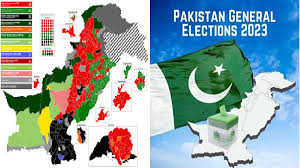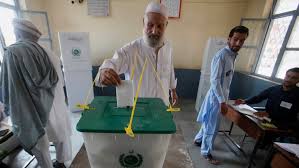Bilawal Bhutto says election delayed is election denied

Liaquat Ali
Islamabad: Chairman Pakistan Peoples Party and the former Foreign Minister of Pakistan, Bilawal Bhutto Zardari addressing the ‘50th anniversary celebration of Pakistan’s Constitution’ hosted by the Supreme Court Bar Association said that he is grateful and honoured to be the first political leader to be addressing this forum in the Supreme Court’s premises.
We appreciate the role of the Bar in upholding the law, rule of law, constitutionalism and human rights in Pakistan. We appreciate that the Bar has played this role regardless of the political inclinations of individual members of the Bar and the office bearers of the Bar Association. The nation values this bipartisan struggle against dictatorship waged by the legal fraternity. This indeed raises our hopes in democracy and fighting dictatorship. We salute your courage and determination in the relentless struggle for the rule of law in Pakistan.
This is the 50th anniversary of the Constitution of Pakistan that was given to the country by my grandfather, Quaid-e-Awam Shaheed Zulfikar Ali Bhutto with the invaluable support of all political parties of the right, left and center, Chairman Bilawal said. Whether of democratic and secular inclinations, or religious persuasions, the unanimous Constitution given by the political parties and leaders of the time also have backing of all the federating units of our federation. This consensus is no small achievement, let there be no doubt about it.
Under the leadership of Quaid-e-Awam, the political leaders of the time rose above political partisanship, a value that has since been systematically eroded over the years. One opposition political leader of the time was asked as to why he had agreed to the Constitution when he opposed Zulfikar Ali Bhutto so vehemently at every turn. In reply, the political leader is reported to have said that the opposition to Bhutto was a political necessity but making the Constitution was a national necessity. Such was the spirit at the time which looks like a dream today.
On the occasion of the 50th anniversary of the Constitution, Chairman Bilawal said that he would like to pay tribute to all 24 members of the Constitutional Committee of 1972, the Legislative Assembly of 1973 which passed the Constitution and the then legal fraternity for achieving this milestone in our national history. They are our national heroes and we salute them.
Standing before the august gathering in the premises of the apex court of Pakistan, Chairman Bilawal expressed his wish to share his thoughts and perceptions about how we see the role played by the judiciary in defending and advancing democracy. He said that he is tempted to speak about it because is under threat once again and the people look up to the judiciary to protect constitutionalism and democracy.
He said that he does not wish to give a ‘textbook narrative’ or delve too deeply in the past. The role played by the judiciary in the past is rather too well-known and bears no repetition. However, a brief peep into the past serves like a rear-view mirror while driving, it helps in course correction. The Constitution is the soul of the State and tearing it means tearing apart the State itself, ridiculing it means ridiculing the people of Pakistan. It is a sacred social contract between the State and the citizens on one hand and the glue that binds the federating units on the other. Abrogating the Constitution means dismembering the federation and alienating the citizens from the State.
When the dictators abrogated it in the past, the judiciary upheld this abrogation sometimes in the name of the ‘doctrine of successful revolution’ and sometimes in the name of the ‘doctrine of necessity’. One felt as if the soul of the State had been torn by those very luminaires who were supposed to protect and defend it. Chairman Bilawal said that he would not like to dwell more on it, as they say, ‘Forget the past, arrange for the present and face the future’. Those who abrogated the Constitution and ridiculed it as merely a 15-page document and those who upheld the abrogation not only disgraced themselves but also heaped disgrace on the people and our nation. They are the traitors of the nation and history will always remember them with this title. This is why it is important to safeguard the Constitution and relentlessly pursue those who have subverted it.
Chairman Bilawal said that he has been a member of the Parliament for five years and has seen the role played by the judiciary from the perspective or the vantage point of the Parliament. The restoration of the judiciary is a result of orchestrated public demonstrations in March 2009, serving as a seminal incident in the judicial history of Pakistan that had a profound impact on the Judiciary-Parliament relations.
In the words of a leading lawyer and member of the movement for the restoration of CJP Iftikhar Chaudhary, stated that the 2009 restoration as a result of public pressure had resulted in judges prone to arrogance and a Bar prone to violence. We witnessed unprecedented judicial activism in the wake of its restoration in 2009. Chief Justice Iftikhar Chaudhary declared that not the Parliament but the Constitution was supreme and the Constitution was what the judges said it was, not what it actually said, not what the founders said but what he said. In 2010 once again, consensus within the Parliament allowed for the passes of the 18th Amendment and the restoration of the 1973 Constitution, for which we are grateful to President Asif Ali Zardari, Senator Raza Rabbani and the entire drafting committee.
The 18th Amendment in 2010 closed the doors for the judges to legitimise constitutional abrogation and barred them from taking oath under the PCO and they could no longer, at least in theory, uphold the subversion of the Constitution. The scope of the punishment for abrogating the Constitution under Article 6 also widened to include those who upheld the abrogation. It was thought that the doors for the dictators had been closed but a new kind of dictatorship emerged. Previously, the Parliament was sent home by the executive order of the President that was endorsed by the judiciary. After the 18th Amendment, that was made impossible.
The judiciary started sending prime ministers home on its own, thus former prime minister Yousaf Raza Gillani was sent home for not writing a letter to the Swiss government to implicate his own President in a criminal case even though the Constitution protected the President from prosecution as long as he was in office. The Pakistan Peoples Party survived it by nominating another MNA as the PM. The next government that followed the PPP also met the same fate. PM Nawaz Sharif was sent home. It is unfortunate but must be mentioned that in the 2013 general elections, the judiciary under Iftikhar Chaudhary became a partisan actor with clear favourites in the elections. In 2018, the judiciary once again became a partisan actor with clear favourites in the elections. It is hoped that this time it will be different. That is of course, if we have elections.
Chairman Bilawal said that the PPP has been demanding an election date and its schedule since the Parliament’s term ended to no avail. Regardless of his well-known opinion on the 90 days, which may now have become a moot point, our right to have an election is absolutely indisputable. At the time of the conflict over elections in the provinces of Punjab and KP, the Party and I made the sincerest efforts for political dialogue, consensus and to resolve a constitutional, political and democratic crisis, he said. Our aim was to reach a consensus on election dates not only for the provinces of Punjab and KP but also the general elections. Unfortunately, the events of May 9 stymied these efforts and today we find ourselves where we are.
Let us be clear, elections delayed are elections denied. The only path forward is for the Election Commission of Pakistan to immediately release the election date and schedule without any further delay, Chairman PPP said. Given the events that we witnessed over the weekend, I trust this shall be no further delayed, Chairman Bilawal said.
It is only through a free, fair and impartial election where all contenders have a level and equal playing field, and the citizens of Pakistan are allowed to exercise their right to vote and in choosing their leaders that we will be able to go forward. Chairman Bilawal said that during his tenure as the Foreign Minister, he met with another prominent foreign minister from a country where they do not have or understand elections.

He was asked what these elections are and why we need them. Chairman Bilawal explained that the people of Pakistan are a very emotional nation and they are vital for catharsis. If someone does not like me, or if I made a mistake in the past five years and meted out any injustices, then the Pakistani people have that one day only to hold me accountable.
Since the PPP is a democratic party and that the Constitution is given by Quaid-e-Awam, for which Shaheed Mohtarma Benazir Bhutto sacrificed her life, which was restored by President Zardari and the PPP through the 18th Amendment to complete the unfinished struggle of Shaheed Mohtarma Benazir Bhutto, there is no other option for us than to demand for the elections to take place and their date and schedule to be announced. Our desire is that the ECP announces the election date and schedule on its own, while completing its legal and constitutional obligation instead of another institution giving it the instructions to do so.
I expect that in interpreting the Constitution, the judiciary will expand the powers of all democratic institutions, not merely its own, Chairman Bilawal said. We have however witnessed that in interpreting the Constitution in the past, the judiciary has enhanced only its own power and undermined that of other institutions. We value the independence of the judiciary and it is the cardinal principle of a democratic society.
However, I sometimes feel that the independence of the judiciary has taken far too far to meaning its independence from the law and the Constitution itself. We believe in the accountability of all under the same law by the same institutions. Independence of the judiciary should not mean its independence from accountability. A reference was filed by over a hundred civil society representatives from all walks of life against a Chief Justice of Pakistan while he was holding office.

The reference was not heard by the Supreme Judicial Council for as long as the Chief Justice was in office. When he retired, the reference was returned to the petitioner as having become infructuous. This raises some questions about accountability particularly because the honourable judges are so fond of claiming and proclaiming their fondness for accountability, particularly when it comes to civilian political leaders.
Every prime minister has presented themselves before this institution [Supreme Court] in one way or the other. One can then imagine that the honourable judges would be the first to present themselves for accountability before their own accountability institutions, Chairman Bilawal said.
He said that there are recent developments that have raised our concerns. Members of the Bar may not agree, but the recent decision on the Practice and Procedure Act has raised the hopes of the Parliament. When President Zardari went from being the most powerful civilian president in the history of Pakistan, having inherited all the powers from a dictator who had usurped those powers from the Parliament and the PM, to the most ceremonial president in the history of Pakistan. He gave his own powers back to the Parliament and the PM. That was a high point in Pakistan’s democratic journey. In the same manner, the full court bench has given hope that the Parliament’s power, domain to legislate will be protected even if it means that the sitting Chief Justice is to share his powers as ‘Master of the Roster’ with fellow senior judges, which is an encouraging sign for the future of the judiciary and Pakistan’s democracy.
The procedure for the appointment of judges also needs to be reviewed. The present procedure which under the President, PM, and the Parliament has become all but a rubber stamp and as post offices has raised the criticism of judiciary of the judges, by the judges and for the judges. This does not augur well for the image of our judiciary. Similarly, the contempt law must also be revisited as the dignity of the honourable judges must rest on foundations that are surer and more solid. Respect for judges must be inspired by their judgements and conduct and not by the fear of a contempt law.
A great challenge we face in the realm of rule of law and human rights is the enforced disappearances of citizens with impunity. The commission on enforced disappearances has unfortunately failed miserably. Not one perpetrator has been persecuted thus far and this is not acceptable. Another great challenge is the manipulation in elections and power transfer. Indeed, manipulated power transfer lies at the root of political instability and the election schedule must be announced immediately and a level playing field be ensured for all political parties.
Referring to the presidential reference regarding the judicial murder of Shaheed Zulfikar Ali Bhutto, Chairman Bilawal said that the reference is pending for almost a decade before the Supreme Court. In this golden jubilee year of the Constitution, is it too much to ask that respect to the political leader who gave us the country’s first unanimous Constitution is given without further delay and justice is served even if posthumously, Chairman Bilawal asked.

They say that history repeats itself, first as a tragedy and then as a farce. Shaheed Zulfikar Ali Bhutto was martyred and Shaheed Mohtarma Benazir Bhutto sacrificed her life after 30 years of struggle for the Constitution and her father. Neither did she attain justice for her father, nor were we able to attain justice for her. Then, President Zardari filed a reference in 2011 without justice being served. Then in 2018/19, he [Chairman Bilawal] himself expressed his desire to be a party in the reference and that it is heard immediately. As of 2023, I am before all of you. He said that he does not know at which point this tragedy became a farce.
Chairman Bilawal said that he believes that Pakistan is stuck in a rut and if we continue down this path, we are doomed. We are doomed to repeat history, perpetuate a tragedy or doomed to make a farce out of the country, its institutions, democracy and people. Throughout our history, we have oscillated between outright dictatorship, controlled democracy or confrontational democracy. Of controlled democracy, the Junejo government and IJI are an example as well as the recent happenings.
This is the old way of doing politics, the tried and tested way which has proved that when democracy is compromised in any shape, way or form the country, its people and economy suffer. However, there is a fourth way and that is of democracy based on consensus. In short little windows, we have witnessed this consensus. We have seen that once we achieve consensus, we are able to progress, of which the 1973 Constitution and the Charter of Democracy, Restoration of Democracy, NFC Award and even the National Action Plan are an example. It is in the very spirit of consensus democracy, that Pakistan’s democracy will not only survive but thrive. We will need this consensus within all institutions, including the Parliament, judiciary and all others.
We would have to establish this consensus not only within institutions but between them as well. We made efforts to establish the very same consensus. It was the basis behind our support of the PDM and the unity government. We had to correct the wrongdoings of the past and rid the country of the selected rule, while getting ‘Izzat’ for the vote and the Parliament while showing all anti-democratic forces how things are run and former rivals move forward together despite differences for the sake of the democracy, Constitution and the country. However, it is after this that I have come to the realisation that the ‘Road to hell is paved with the best intentions’, Chairman Bilawal said proverbially. We were seeing institutions turn neutral overnight.
The old politics of hyper-partisanship and hyper-polarisation must end within the Parliament, judiciary, society and the Bar. if we want to become a just society, then we would have to tolerate a difference of opinion. We must use the Parliament and judiciary and other such institutions and bodies to forge consensus in order to resolve problems, not as bitter partisan arenas for us to create problems. We owe it to the people of Pakistan to start functioning as a modern country, with a functioning government system, Parliament, judiciary and Constitution.
There would be no better way to celebrate our golden jubilee than to deliver on these promises to the people of Pakistan. Let us end the stale politics of the past and embrace a new politics of consensus, Chairman Bilawal said. While on the 50th Golden Jubilee of the Constitution, I cannot say that democracy is stronger today than it was yesterday, but can promise that the tomorrow of the coming generations of Pakistan will be better than our today, Chairman Bilawal resolved.





